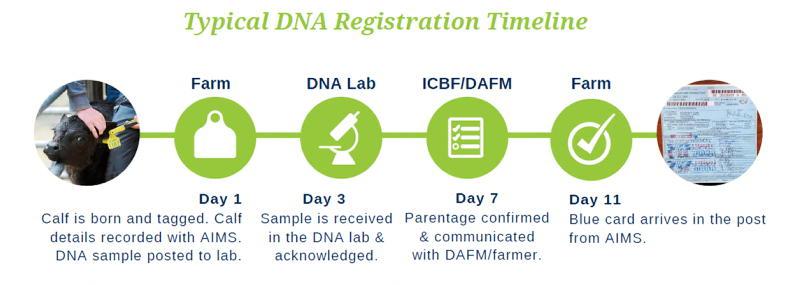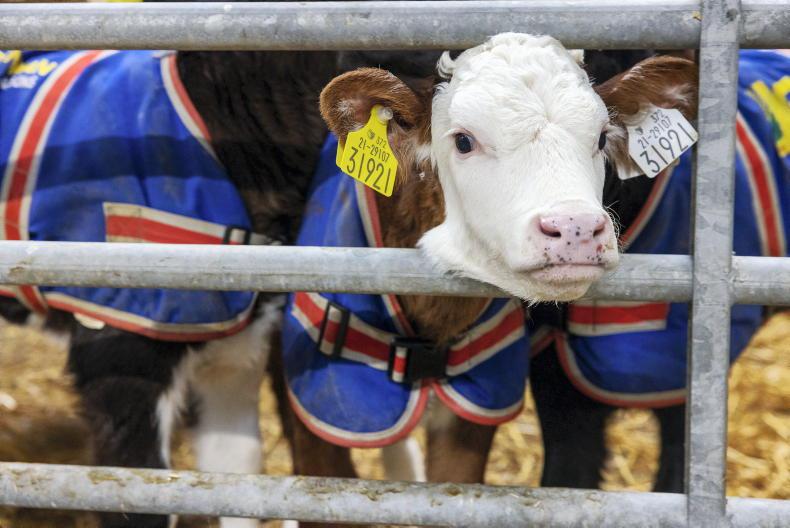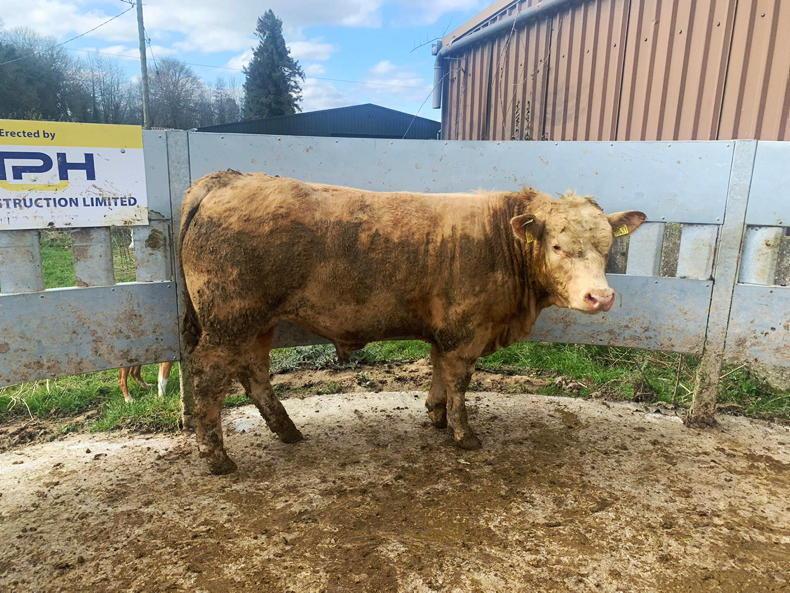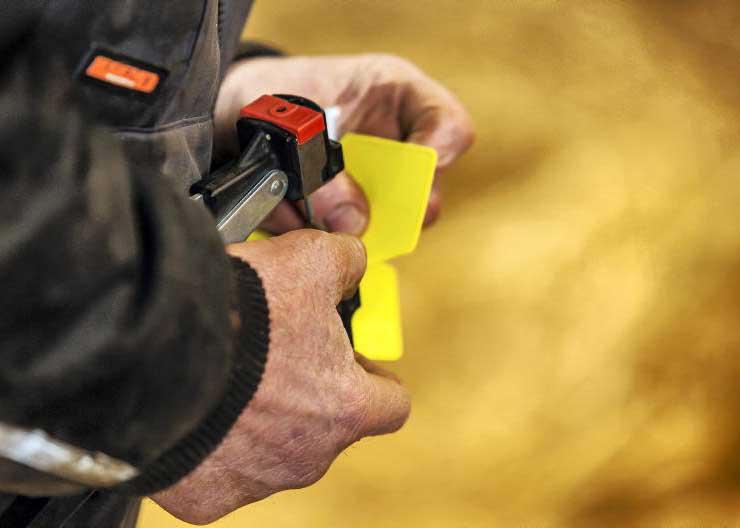The first of the 2024 National Genotyping Programme (NGP) samples have started arriving in the genotyping lab and are being processed. The NGP will see over 10,500 herds register close to 750,000 calves via the new DNA registration process over the course of 2024.
Dairy farmer Stephen Lawlor from Navan in Co Meath is one of the many farmers who has had some 2024-born calves go through the national genotyping calf registration process so far this year.
“I’ve been involved in the DNA calf registration pilot for the last number of years, so joining the National Genotyping Programme was the obvious next step for the herd. To date, I have found registering calves at birth hugely beneficial. I can ensure I keep the best replacements by having the genomic information early on.
“The turnaround time between posting off the sample and receiving the animal’s passport is very efficient; it took just over a week.”
The NGP is a collaborative initiative, enabling Ireland to take the first step in achieving a fully genotyped national herd.
The NGP has been developed based on a cost-sharing model between the Department of Agriculture, Food and Marine, the beef and dairy industry and participating farmers.
Genotyping the national herd will provide a vast opportunity for the dairy and beef industry to accelerate the rates of gain of our national breeding indices, such as EBI, €uro-Stars and the dairy beef index (DBI), improving farm sustainability and enhancing traceability.
Farmers can rest assured that NGP calf samples are the highest priority in the genotyping lab.
In 2022 and 2023, the average lab turnaround time was four to five days. Including postage, the whole process, from tagging the animal to issuing its passport, can take an average of 10 to 12 days. Posting DNA samples to the genotyping lab at least twice weekly at peak calving is recommended.
As calving slows down, it may be sufficient for samples to be sent once a week.
Farmers who have not yet ordered their 2024 calf tags should do so as soon as possible. A direct debit for the genotyping fee (€4/calf) for newborn calves will be triggered once calf tags are ordered with your nominated tag supplier. This will be collected from the herdowner by ICBF approximately within a month of the order.
Leftover tags
Farmers with leftover conventional single-tissue tags from 2023 can continue to use them. If using leftover tags, to comply with the DNA element of the programme, farmers must contact their tag supplier to order corresponding DNA button tags, to genotype these calves at birth.
Calf registration can be completed on the Agfood.ie website or through the available farm software packages.
It is important to note that paper registrations and registrations via the Department of Agriculture Calf Reg mobile app are incompatible with this programme. Herds participating in NGP are advised to remove the Department Calf Reg app from their devices to avoid confusion.
Once the calf is tagged, the farmer should submit registration details straight away (don’t wait for DNA results).
As with any registration, the farmer will be required to enter in a date of birth, gender, dam, sire breed and whether the calf was stillborn.
When the sample has been analysed by the lab, the DNA results will be sent to the Department, and any incorrect parentage or gender details recorded by the farmer will be corrected automatically before the calf passport is issued.
If a farmer has an issue with the predicted results, they should contact the HerdPlus office by email at query@icbf.com or call 023-8820452 to discuss/rectify.
Herds taking part in the NGP should download the new ICBF HerdPlus App for quick and easy visibility on the genotyping status of their calves being registered via the DNA process.
To download the app, search for ‘ICBF HerdPlus’ in your app store.

The calf will receive a genomic evaluation within two weeks of the sample result being returned from the lab. It is the farmer’s responsibility to return samples in a timely manner.
The more regularly they are sent off, the quicker the turnaround time for registration and evaluation will be.
Scale
The scale of the programme is a world-first and sees Ireland, once again, placed firmly at the forefront when it comes to national sustainability efforts.
Genotyping at birth will confirm parentage and correct any errors prior to registration.
This information is crucial in reducing the level of parentage errors that currently sit at an average of 15% nationally.
With no sire at all recorded on up to 28% of calves born in dairy and beef herds, this information will also help fill in a large portion of the blanks, linking sires back to their offspring for more accurate evaluations.
The analysis has shown that the CBV is predicting animals that ultimately have higher carcase performance
Furthermore, animals sampled at birth will receive genomic evaluations at the earliest possible opportunity, increasing the reliability of their EBI and €uro-Star figures well before they are selected or sold for breeding.

Based on animals traded through the marts last year, 2024 should see close to 85,000 calves with their commercial beef value (CBV) displayed on mart boards.
The CBV is an important development in the trading of beef animals. Whether it be dairy male calves at three weeks old, or continental suckler steers at 18 months old, having genetic information to hand when making sale or purchase decisions is vital for farmers.
The analysis has shown that the CBV is predicting animals that ultimately have higher carcase performance.
Farmers can, therefore, confidently incorporate the CBV into their sale and purchase decisions.
Frequently
Asked Questions
What happens if I lose a sample down the slats or a sample breaks when tagging?
If a sample is lost or damaged, you can order a replacement button tag from your tag supplier.
Do I have to sample dairy males/dairy x beef calves/commercial beef males?
Yes. All calves must be sampled, regardless of sex or breed.
What if the calf is stillborn or dies?
If a calf is stillborn or dies before it is registered, tag AND sample the calf before the knackery collects it. The samples must still be posted, and the rest of the registration must be completed as with the live calves.
How do I tell the difference between the BVD sample and the DNA sample?
DNA samples will always be the pink bottle.
Where do I send the sample?
DNA samples must be sent to: ICBF Genotype Laboratory, PO Box 1104, Naas Mail Centre, Co Kildare.
Samples can be returned using the envelopes provided along with your tag orders.
How much will it cost to post my DNA samples?
Similar to BVD samples, the cost is €2.45 to post up to 10 samples that are packed flat.
The sample came back as ‘empty’. Do I have to resample this calf? And is this calf registered?
Yes, you will need to resample the calf. You will need to order a button tag same as you would with BVD. The calf is not registered. The calf will only be registered when the new sample has been processed.
What happens if I have recorded the incorrect parentage?
If the genotype determines a different parentage, this will automatically be updated on the calf’s passport before it is issued.
What happens if the registration is late?
The legal requirement to register the birth of a calf within 27 days still applies. However, once you submit your own registration records within 27 days, you will not receive a late registration notice even in the unlikely event the genotype results are delayed.
The first of the 2024 National Genotyping Programme (NGP) samples have started arriving in the genotyping lab and are being processed. The NGP will see over 10,500 herds register close to 750,000 calves via the new DNA registration process over the course of 2024.
Dairy farmer Stephen Lawlor from Navan in Co Meath is one of the many farmers who has had some 2024-born calves go through the national genotyping calf registration process so far this year.
“I’ve been involved in the DNA calf registration pilot for the last number of years, so joining the National Genotyping Programme was the obvious next step for the herd. To date, I have found registering calves at birth hugely beneficial. I can ensure I keep the best replacements by having the genomic information early on.
“The turnaround time between posting off the sample and receiving the animal’s passport is very efficient; it took just over a week.”
The NGP is a collaborative initiative, enabling Ireland to take the first step in achieving a fully genotyped national herd.
The NGP has been developed based on a cost-sharing model between the Department of Agriculture, Food and Marine, the beef and dairy industry and participating farmers.
Genotyping the national herd will provide a vast opportunity for the dairy and beef industry to accelerate the rates of gain of our national breeding indices, such as EBI, €uro-Stars and the dairy beef index (DBI), improving farm sustainability and enhancing traceability.
Farmers can rest assured that NGP calf samples are the highest priority in the genotyping lab.
In 2022 and 2023, the average lab turnaround time was four to five days. Including postage, the whole process, from tagging the animal to issuing its passport, can take an average of 10 to 12 days. Posting DNA samples to the genotyping lab at least twice weekly at peak calving is recommended.
As calving slows down, it may be sufficient for samples to be sent once a week.
Farmers who have not yet ordered their 2024 calf tags should do so as soon as possible. A direct debit for the genotyping fee (€4/calf) for newborn calves will be triggered once calf tags are ordered with your nominated tag supplier. This will be collected from the herdowner by ICBF approximately within a month of the order.
Leftover tags
Farmers with leftover conventional single-tissue tags from 2023 can continue to use them. If using leftover tags, to comply with the DNA element of the programme, farmers must contact their tag supplier to order corresponding DNA button tags, to genotype these calves at birth.
Calf registration can be completed on the Agfood.ie website or through the available farm software packages.
It is important to note that paper registrations and registrations via the Department of Agriculture Calf Reg mobile app are incompatible with this programme. Herds participating in NGP are advised to remove the Department Calf Reg app from their devices to avoid confusion.
Once the calf is tagged, the farmer should submit registration details straight away (don’t wait for DNA results).
As with any registration, the farmer will be required to enter in a date of birth, gender, dam, sire breed and whether the calf was stillborn.
When the sample has been analysed by the lab, the DNA results will be sent to the Department, and any incorrect parentage or gender details recorded by the farmer will be corrected automatically before the calf passport is issued.
If a farmer has an issue with the predicted results, they should contact the HerdPlus office by email at query@icbf.com or call 023-8820452 to discuss/rectify.
Herds taking part in the NGP should download the new ICBF HerdPlus App for quick and easy visibility on the genotyping status of their calves being registered via the DNA process.
To download the app, search for ‘ICBF HerdPlus’ in your app store.

The calf will receive a genomic evaluation within two weeks of the sample result being returned from the lab. It is the farmer’s responsibility to return samples in a timely manner.
The more regularly they are sent off, the quicker the turnaround time for registration and evaluation will be.
Scale
The scale of the programme is a world-first and sees Ireland, once again, placed firmly at the forefront when it comes to national sustainability efforts.
Genotyping at birth will confirm parentage and correct any errors prior to registration.
This information is crucial in reducing the level of parentage errors that currently sit at an average of 15% nationally.
With no sire at all recorded on up to 28% of calves born in dairy and beef herds, this information will also help fill in a large portion of the blanks, linking sires back to their offspring for more accurate evaluations.
The analysis has shown that the CBV is predicting animals that ultimately have higher carcase performance
Furthermore, animals sampled at birth will receive genomic evaluations at the earliest possible opportunity, increasing the reliability of their EBI and €uro-Star figures well before they are selected or sold for breeding.

Based on animals traded through the marts last year, 2024 should see close to 85,000 calves with their commercial beef value (CBV) displayed on mart boards.
The CBV is an important development in the trading of beef animals. Whether it be dairy male calves at three weeks old, or continental suckler steers at 18 months old, having genetic information to hand when making sale or purchase decisions is vital for farmers.
The analysis has shown that the CBV is predicting animals that ultimately have higher carcase performance.
Farmers can, therefore, confidently incorporate the CBV into their sale and purchase decisions.
Frequently
Asked Questions
What happens if I lose a sample down the slats or a sample breaks when tagging?
If a sample is lost or damaged, you can order a replacement button tag from your tag supplier.
Do I have to sample dairy males/dairy x beef calves/commercial beef males?
Yes. All calves must be sampled, regardless of sex or breed.
What if the calf is stillborn or dies?
If a calf is stillborn or dies before it is registered, tag AND sample the calf before the knackery collects it. The samples must still be posted, and the rest of the registration must be completed as with the live calves.
How do I tell the difference between the BVD sample and the DNA sample?
DNA samples will always be the pink bottle.
Where do I send the sample?
DNA samples must be sent to: ICBF Genotype Laboratory, PO Box 1104, Naas Mail Centre, Co Kildare.
Samples can be returned using the envelopes provided along with your tag orders.
How much will it cost to post my DNA samples?
Similar to BVD samples, the cost is €2.45 to post up to 10 samples that are packed flat.
The sample came back as ‘empty’. Do I have to resample this calf? And is this calf registered?
Yes, you will need to resample the calf. You will need to order a button tag same as you would with BVD. The calf is not registered. The calf will only be registered when the new sample has been processed.
What happens if I have recorded the incorrect parentage?
If the genotype determines a different parentage, this will automatically be updated on the calf’s passport before it is issued.
What happens if the registration is late?
The legal requirement to register the birth of a calf within 27 days still applies. However, once you submit your own registration records within 27 days, you will not receive a late registration notice even in the unlikely event the genotype results are delayed.












SHARING OPTIONS